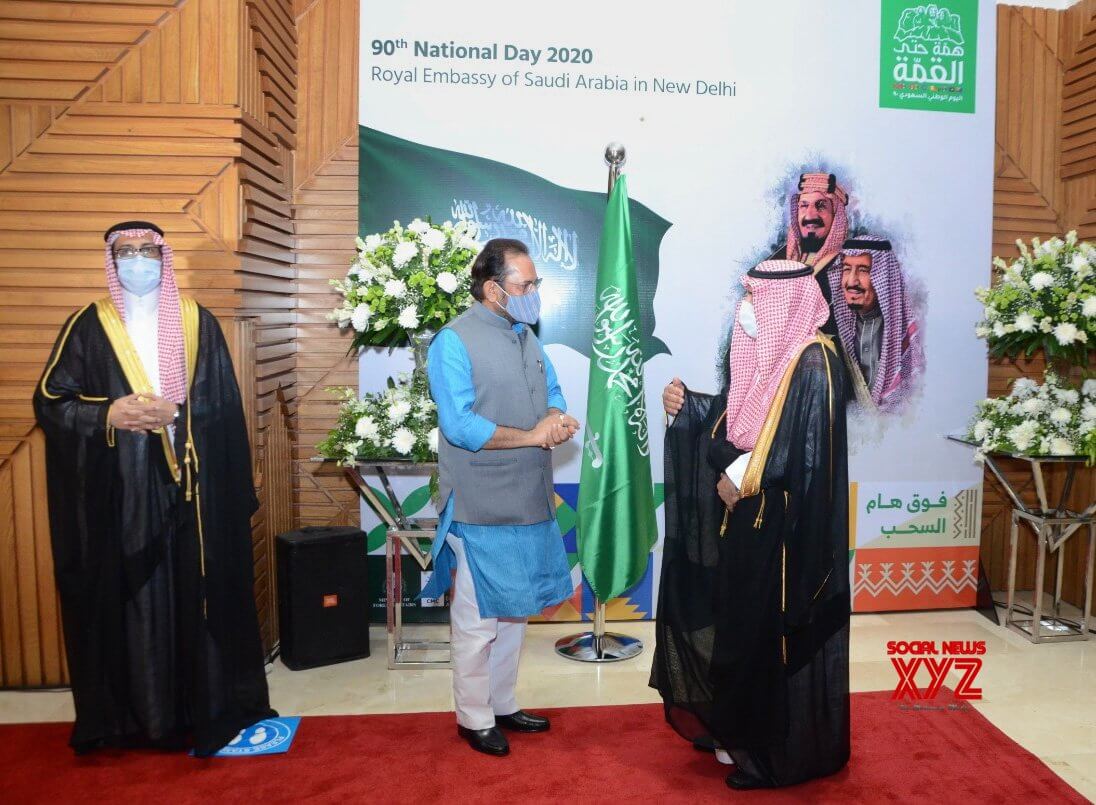On September 23, Saudi Arabia celebrated its 90th National Day at its embassy in New Delhi. The event was attended by the Indian External Affairs Minister S. Jaishankar, National Security Adviser (NSA) Ajit Doval, and Minority Affairs Minister Mukhtar Abbas Naqvi. The event also hosted representatives from the United States (US), Palestine, and Lebanon.
This is the second such diplomatic event conducted by an embassy in India following the COVID-19 outbreak. While the first event, which was the celebration for Afghanistan’s national day, was attended by the NSA, the Saudi event saw the attendance of both Doval and Jaishankar, which is a rare occurrence. Specifically, with the number of invitees to the event being extremely limited, many see this as an indication of India’s growing friendship with Saudi Arabia.
Following the event, S. Jaishankar, on Twitter, congratulated the Kingdom’s government and his Saudi counterpart Prince Faisal bin Farhan al-Saud on its national day. He further spoke of expanding the two countries’ “Strategic Partnership”.
Warmest greetings to FM HH Prince @FaisalbinFarhan and the Government and people of Saudi Arabia on their National Day. Our expanding cooperation across so many sectors reflects the intrinsic strength of our ties. Look forward to further advancing our Strategic Partnership.
— Dr. S. Jaishankar (@DrSJaishankar) September 23, 2020
Saudi Arabia’s ambassador to India, Saud Al-Sati, too, during his address at Wednesday’s event, celebrated India as a “close friend and an important strategic partner” for the Kingdom. He said, “Through the mechanism of the Strategic Partnership Council (SPC), we are working on further strengthening our partnership and deepening our friendship … In the beginning of 2020, the Kingdom of Saudi Arabia has awarded 41 new for foreign investment projects to Indian investors.” He added that the two countries were “enhancing cooperation in commercial, investment, and technological fields” and that current bilateral trade, which stands at around $34 billion, will “surely continue to grow”. Further, he added, “Our cultural, socioeconomic engagement and strategic partnership is based on mutual respect and shared interest … Saudi Arabia and India identify tens of opportunities of joint collaboration and investments across various sectors.”
India and Saudi Arabia have been expanding their cooperation on several fronts over the past few years. In light of their growing friendship, Saudi’s Crown Prince Mohammed bin Salman visited India in 2019, which was shortly followed by Indian Prime Minister Narendra Modi’s visit to the Kingdom. Saudi Arabia has emerged as India’s second-largest supplier of energy, and the two nations have recently ramped up their collaboration in areas such as security and technology as well. Furthermore, with around 2.6 million Indians living in the Kingdom, Indians form the largest population of expatriates in Saudi Arabia. Saudi Arabia also acknowledged India as a crucial partner under its Vision 2030 program and has collaborated the plan with several Indian initiatives such as “Make in India” and “Digital India”.
This comes at a crucial time as Saudi Arabia’s relationship with Pakistan is growing increasingly bitter. Bilateral ties between Riyadh and Islamabad took a turn for the worse when the Kingdom denied the South Asian country’s appeal to convene an Organisation of Islamic Cooperation’s (OIC) Council of Foreign Ministers meet to discuss the Kashmir issue. Pakistan’s Foreign Minister, Shah Mahmood Qureshi, said, “If you cannot convene it, then I’ll be compelled to ask Prime Minister Imran Khan to call a meeting of the Islamic countries that are ready to stand with us on the issue of Kashmir and support the oppressed Kashmiris.” For Saudi Arabia, which is India’s fourth-largest partner in trade, taking a strong stand against India is against its economic interests.
Qureshi’s statement was the spark that ignited tensions between Pakistan and Saudi Arabia. In November 2018, during Saudi Crown Prince Mohammed bin Salman’s diplomatic visit to Islamabad, the two countries signed a $6.2 billion package that included $3 billion in fiscal loans and $3.2 billion in oil credit facilities. In retaliation to Qureshi’s statement, Saudi Arabia halted its oil supply and ended a financial loan deal with Pakistan. These developments also raise doubts about the future of 2019 MoUs signed between the two Islamic countries, that comprised Saudi investments in Pakistan valued at around $20 billion, including the setting up of an oil refinery in the port city of Gwadar, which is also a strategic area at the crossroads of the Gulf of Oman and a crucial element of the China-Pakistan Economic Corridor (CPEC) project.

